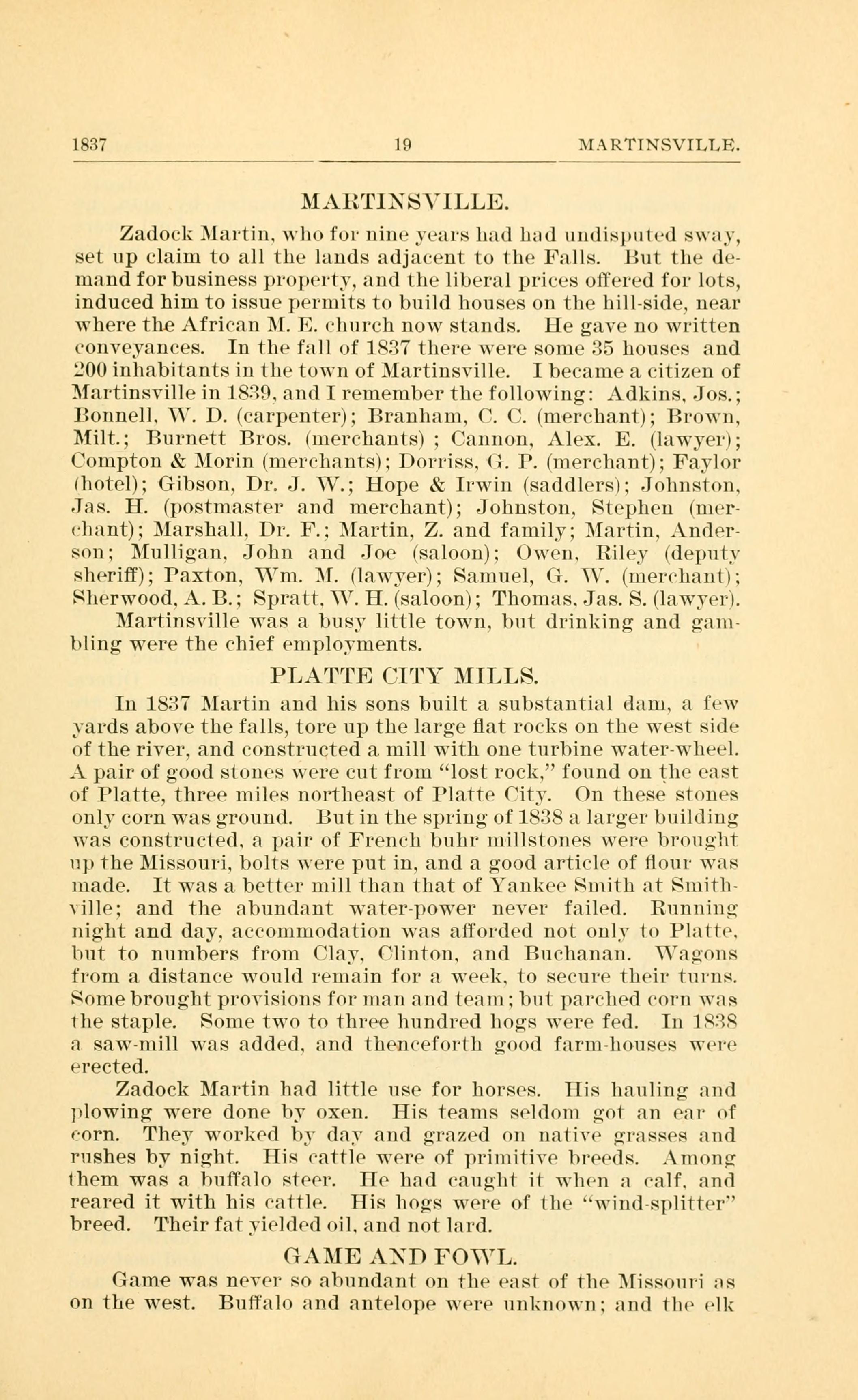Annals of Platte County, Missouri - Paxton
[previous page] [next page]

[previous page] [next page]
1837 19 MA RTINSVILLE. lIA1{TlISlLLE. Zadock Martin. who for nine ea1s had had undisputed sway, set up claim to all the lands adjacent to the Falls. But the de- mand for business p1opertv, and the liberal prices oered tor lots, induced him to issue permits to build houses on the hillside. near where the African M. E. church now stands. He gave no written conveyances. In the fall of 1837 there were some 35 houses and 200 inhabitants in the tow11 of Martinsville. I became a citizen of Martinsville in 1839. a11d I remember the following: Adkins. Jos.; Bonnell. V. D. (carpenter); Branham. C. C. (merchant); Brown. Milt.; Burnett Bros. tmerchants) ; Cannon, Alex. E. (lawyer); Compton & Morin (merchants); Dorriss. G. I. (merchant); Faylor (hotel); Gibson. Dr. J. W.; Hope & Irwin (saddlers): Johnston. Jas. H. (postmaster and merchant); Johnston. Stephen (mer- ehant): Marshall. Dr. F.; Martin, Z. and family; hlartin. Antler son; Mulligan. John and Joe (saloon); Owen. Riley t/deputv sheri); Paxton. Wm. M. (lawyer); Samuel, G. W. (Inerchantl: Sherwood. A. B.; Spratt. V. H. (saloon); Thomas. Jas. S. (lawverl. Martinsville was a busy little town. but drinking and gain- bling were the chief employments. PLATTE CITY MILLS. In 1837 Martin and his sons built a substantial dam. a few yards above the falls, tore up the large at rocks on the west side of the river, and constructed a mill with one turbine water-wheel. A pair of good stones were cut from lost rock. found on the east of Platte, three miles northeast of Platte City. On these stones only corn was ground. But in the spring of 183821 larger building was constructed. a pair of French buhr millstones were brought up the Missouri. bolts were put in. and a good article of flour was made. It was at better mill than that of Yankee Smith at Cinith~ ville; and the abundant water-power never failed. Running night and day. accommodation was afforded not only to Platte. but to numbers from Clay. (llinton. a11d Buchanan. \agons trom a distance would remain for a week. to secure their turns. Some brought provisions for man and team : but parched corn was the staple. Some two to three hundred hogs were fed. In 189.9 a saw-mill was added. and thenceforth good farm-houses were erected. Zadock Martin had little use for horses. His hauling and plowing were done by oxen. His teams seldom got an ear of corn. They worked by dav and grazed on native grasses and rushes by night. His cattle were of primitive breeds. Among them was a buffalo steer. He had caught it when a calf. and reared it with his cattle. His hogs were of the wind-splitter" breed. Their fat yielded oil. and not lard. GAME AND FOWL. Game was never so abundant on the east of the Missoui-i as on the west. Buffalo and antelope were unknown; and the elk